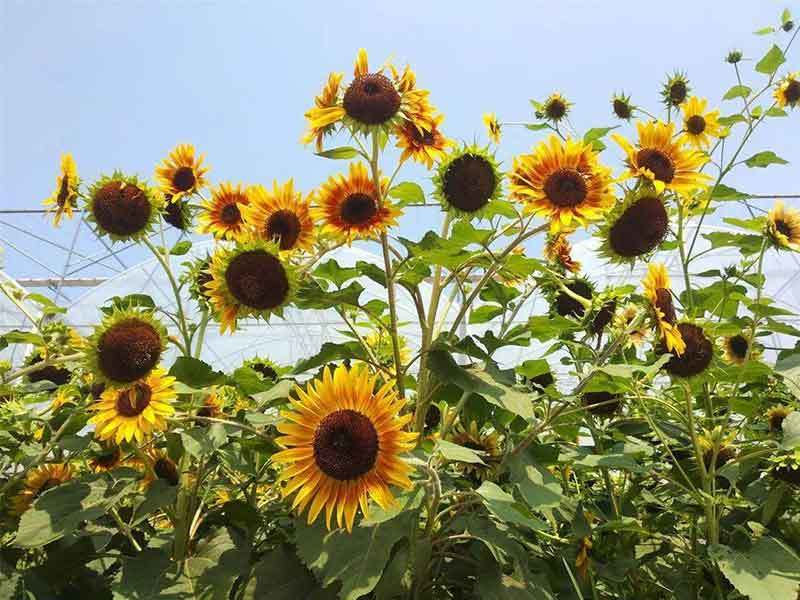When to Plant Sunflowers in Michigan? - Wilson Garden
Introduction
When growing sunflowers in Michigan, timing is everything. You should know when to sow the sunflower seeds.
Key Factors Influencing Sunflower Growth
Sunflower growth is influenced by several factors. For example, sunlight, water and temperature. Sunflowers thrive in full sun. So pick a spot with at least 6-8 hours of direct sunlight.
Sunflowers are fairly drought-tolerant once established. However, you should water them consistently during the seedling stage. In Michigan, rainfall during the summer months can usually provide adequate moisture.
When to Plant Sunflowers in Michigan?
Early Spring Planting
The last spring frost is usually around May 15. The best time to plant sunflowers in Michigan is between mid-April and early May. Sunflowers will establish strong root systems before summer.
The cool weather of spring can also shield young sunflower shoots from drought stress. But you need to watch out for late frosts. You should have frost protection measures at the ready.
Late Spring Planting
Planting in late May offers a slightly shorter growth window. But the risk of frost diminishes significantly. Sunflowers will avoid the potentially stunting effects of unexpected cold spells. Furthermore, sunflowers can cater to pollinators not typically active in early spring.
Swift transition to warm temperatures can cause premature bolting in sunflowers. This leads to small blooms. Therefore, choose more heat-tolerant varieties if you're opting for a late start.
When to Plant Sunflower Seeds in Michigan?
March-April: Preparing the Soil and Starting Seeds Indoors
Soil Preparation: Sunflowers are relatively resilient. The well-drained loamy soil with a pH leave 6.0-7.5 is ideal. Michigan has clayey soil in many areas. A bit of amending with peat moss and sand can go a long way.
Add organic matter helps retain moisture and reduce compaction. You can also use raised beds which can help with drainage and warm up soon in the season.
Indoor Seed Starting: The unpredictable frosts can spell disaster for sunflower seedlings. Starting seeds indoors around mid-to-late March. You can use biodegradable pots or peat pellets. They can avoid root disturbance when transplanting.
Keep your indoor setup near a south-facing window. Provide ample sunlight or use artificial light if needed. Make sure the soil temperature is between 70-85°F. This is ideal for sunflower seeds to germinate. So a seedling heat mat can be beneficial.
May: Transplanting Seedlings or Direct Sowing Outdoors
Transplanting Seedlings: If started seeds indoors, you should harden off your seedlings. You can gradually expose them to outdoor conditions. Transplant them once the frost has passed. This is usually in the second or third week of May.
Direct Sowing: If you didn't start your seeds indoors, you can direct sowing in May. Sow seeds about 1 to 1.5 inches deep, spaced 6 inches apart. Keep the soil consistently moist but not waterlogged.

How to Grow Sunflowers in Michigan?
Selecting the Right Sunflower Varieties
Opt for those with a short growing season, typically 70 to 90 days. Especially if you're located in the north. Autumn Beauty and Italian White are popular varieties.
Purchase seeds from a reputable supplier when planting sunflowers in Michigan. Check the seed packets for the appropriate growing information. For example, height, bloom size, and specific care needs.
Proper Spacing and Planting Depth
Sunflowers require adequate space to reach their full potential. Plant seeds 1.5 to 2.5 inches deep. Space them 6 to 12 inches apart, and in rows 20 to 30 inches apart.
This spacing allows for good air circulation and prevents disease. For tall varieties, you should increase the spacing to accommodate the larger plants. For example, Mammoth or Giant Russian.
Watering and Fertilization Guidelines
Sunflowers need regular watering, especially during dry periods. Keep the soil moist but not waterlogged. Sunflowers do not tolerate wet feet. You should use drip irrigation systems or soaker hoses. They can maintain consistent moisture levels without disturbing the soil around the plants.
Fertilize the soil with a balanced fertilizer at planting. Then, again when the plants are a foot tall. Follow the instructions on the fertilizer label. You should avoid overfeeding. This can lead to excessive foliage growth at the expense of flowers.
Pest and Disease Management Strategies
Keep an eye out for common pests. For example, sunflower moth, aphids, caterpillars, and birds. They can eat the seeds or dig up young sprouts. Apply neem oil or handpick pests to manage infestations. You can deter birds with reflective items or netting.
Sunflowers are relatively resistant to most diseases. Keep the garden free of debris and providing good air circulation can help prevent issues. If you notice any signs of disease, treat the plants with a fungicide labeled for sunflowers. For example, powdery mildew and Sclerotinia.
Harvesting Sunflowers
Signs of Sunflowers Ready for Harvest
You can harvest when the back of the head turns brown and the florets begin to dry. The seeds should be plump and the shell hard. An additional sign is the gentle tap of the head. It produces a hollow sound when seeds are ready.
Harvesting and Preserving Sunflower Seeds
To harvest, cut the sunflower head with a few inches of stem. Hang in a dry, well-ventilated area until the seeds are completely dry. Then, gently rub the seeds out of the head. Lay them in a single layer to dry further. Store dried seeds in an airtight container in a cool, dark place.
Creative Ways to Use Harvested Sunflowers
Beyond being a nutritious snack, sunflower seeds have many other uses. You can use them in baking or tossed onto salads for a nutritional boost. You can incorporate empty seed heads into a fall wreath or arrange them in a decorative bouquet. Better yet, leave some out for the birds to enjoy during the winter months.
Conclusion
Planting sunflowers in Michigan is a rewarding activity. You can enjoy your own sunflowers with the right planting time and proper care.

